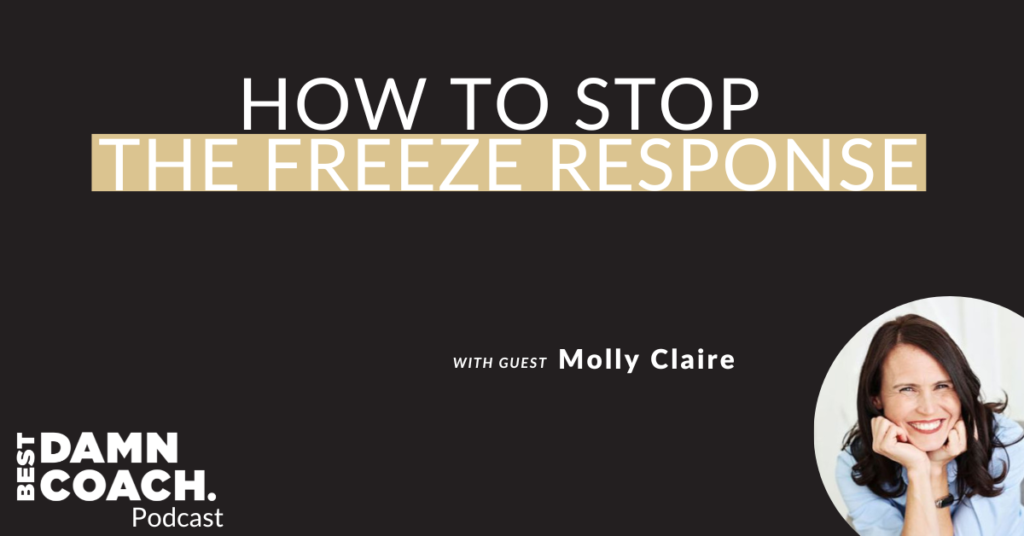How To Stop The Freeze Response With Molly Claire
In the fast-paced world of coaching, it’s easy to get caught up in the hustle and forget about our own well-being. But as coaches, we can’t pour from an empty cup. That’s why I had a heart-to-heart with fellow coach Molly Claire on a recent podcast episode. We dove into the nitty-gritty of how to prioritize well-being while building a thriving coaching business. Molly shared her personal experiences and insights on everything from making tough decisions to understanding the role of our nervous system in our success.
If you’re a coach feeling the pressure, this episode is a must-listen. Molly’s story is a powerful reminder that it is possible to build a successful and fulfilling coaching business without sacrificing your well-being.
Who is Molly
Molly is a Master Coach Instructor and founder of Holistic Master Coach Training inside The Masterful Coach Collective. She helps coaches develop superior coaching skills so they can guarantee results for their clients, while designing a simple, profitable business model. She believes that you can coach more, market less, and create the ideal quality of life you desire. Molly is a 7-figure business builder, proud mom of 3, top 3% podcaster, and best-selling author of The Happy Mom Mindset.
Setting Firm Commitments
In the coaching world, we often talk about the power of making a decision and committing to it fully. This hit home for me when I chatted with fellow coach Molly Claire recently. She shared how making firm commitments propelled her forward, even when faced with the challenges of being a single mom. Molly’s story is a powerful reminder that unwavering determination is key to building a successful coaching business.
But it’s not just about making decisions; it’s also about understanding why we make them. Molly opened my eyes to the negative impact of using thought work to justify actions that don’t align with our true desires. It’s a trap I’ve fallen into myself, and her insights were a much-needed wake-up call.
Embracing Emotional Intelligence
As coaches, we often talk about the importance of emotional intelligence, but what does that really mean in practice? In my conversation with Molly, I was reminded of how crucial it is to not only understand our own emotions but also to regulate our nervous system. When we’re stressed or overwhelmed, it’s easy to get caught up in fight, flight, or freeze responses. But by recognizing these patterns and using grounding techniques like tapping or simply focusing on our peripheral vision, we can create a calmer, more centered space for ourselves and our clients.
Molly’s insights into the role of the nervous system were a game-changer for me. It’s not just about managing our thoughts and emotions; it’s about understanding the physiological responses that can sabotage our success. By learning to regulate our nervous system, we can show up as more effective, empathetic coaches who are better equipped to handle the challenges that come our way.
Nurturing Well-Being as a Coach
Molly Claire’s wisdom on navigating well-being as a coach offers a valuable roadmap for professionals in the coaching industry. By making firm commitments, embracing emotional intelligence, and understanding the role of the nervous system, coaches can elevate their practice and foster a sustainable approach to personal growth and success. Incorporating these insights into daily coaching practices can lead to a more balanced and fulfilling coaching journey.
Through mindfulness, self-awareness, and a commitment to holistic well-being, coaches can cultivate a thriving practice that not only benefits their clients but also nourishes their own mental and emotional health. By integrating these principles into their coaching approach, coaches can create a lasting impact on both themselves and those they serve.
Want to Connect with Molly?
- Website
- Instagram: @mollyclaircoaching
- Free Training: myperfectbiz.com (Ideal Life and Business Vision)
- Private Podcast: myperfectbiz.com (Mindset, Emotions, Nervous System, and Action Strategies)



